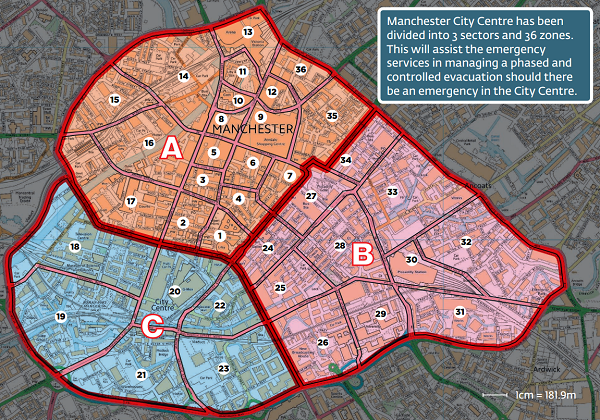Preparing for a City Centre Emergency
Have you considered the impacts of emergencies on your business or organisation? In a changing city, with risks and threats evolving and emerging, it is always worth reviewing emergency procedures in case of an acute or major incident. Businesses can be affected by a sudden impacts such as significant reduction of staff, denial of access to your premises, unexpected loss of electricity or gas mains supply, loss of mains water supply or sewerage services, disruption to transport, loss of telecommunications or computer systems, loss of financial transaction services or disruption which affects suppliers.
Are you prepared?
Greater Manchester Resilience Forum
The GMRF is a multi-agency partnership from across the region, with responsibility for coordinating and overseeing emergency planning.
BERG ’10 Minute Plan’
The Business Emergency Resilence Group toolkit is designed to help small to medium-sized businesses prepare for, respond to, and recover from, emergencies such as flooding, cybercrime and civil unrest.
Use the planning guide: berg_10_minute_plan
City Centre Evacuation Zones
Manchester City Centre has been divided into 3 sectors and 36 zones. This will assist the emergency services in managing a phased and controlled evacuation should there be an emergency in the city centre.
What should I do if an evacuation of my zone is required?
- Follow the advice of the emergency services.
- Implement your building evacuation plan and make sure everyone is out and accounted for.
- Use security staff and other nominated staff to direct people to assembly points.
- Secure your building (if possible).
- The emergency services will inform you of when it’s safe to return to the affected areas of the city centre.
How can I prepare?
- You should prepare an evacuation plan for your premises and consider: how staff/visitors will be alerted. Ensure that they know what to do and where to go.
- Who has responsibility for building evacuation and how are they trained?
- Pre-identify fire assembly points a safe distance from your building.
- Pre-identify bomb assembly points (both primary and secondary) in different zones, based on minimum cordon distances, eg. 100m, 200m and 400m.
- An assembly point outside the city centre.
- Consider the option of invacuation areas/the use of protected spaces, should an incident not warrant immediate evacuation (or in the event of a firearms attack).
- How would you support staff or visitors with specific needs (eg. visual impairments)?
- Prepare a ‘grab bag’ to take with you.
Grab-Bag Check List
- Torch
- Mobile phone, charger and contact list
- Radio
- Information and documents
- Keys
- Money
- First Aid Kit
- Bottled water
If you are a CityCo or Manchester BID Member, and need assistance, please email operations@cityco.com


